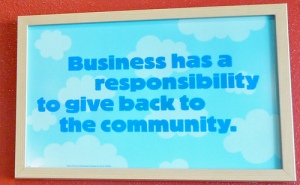Posts tagged ‘Social responsibility’
CSR: What’s In For Small Businesses?
Here are some prejudices concerning CSR/Sustainability and Small and Medium Enterprises (SME):
- Sustainability is for big companies
- Sustainability is too expensive
- Sustainability requires too many resources
- Sustainability is marketing, we cannot afford marketing campaigns
- We are far too few people, we don’t need social responsibility
These are some of the opinions I have to counterback when I explain sustainability to friends, relatives or even owners of small businesses. Most of them look at me skeptical and surprised. Their looks say «Small businesses have enough to do trying to survive in the current situation, they dont have time to think about social responsibility or sustainability». However, the expression on their faces changes as soon as I start talking about the benefits of a sustainable strategy for a SME. SME are in fact open for CSR, as I explained in a previous post.
Which one is the most important benefit for a SME that engages in CSR/Sustainability? Take the poll!
My response to the Wall Street Journal article
There was an article in the Wall Street Journal earlier this week. It attacked the role of Corporate Social Responsibility in creating profit for companies. The article also questioned that companies, by promoting common good, could generate more profit. Dr Karnani uses a series of arguments, so easy to refute, that I am very surprised they come from a university professor.
Profit is not equal short-run profit
It looks like Dr. Karnani identifies profit with short-term profit; however, the profit that ensures the existence of the company throughout the years is long-term profit. Unless Dr. Kanani has in mind only speculative business, I don’t understand why he is concentrating on the short run.
CSR is not equal philanthropy
CSR is so much more that giving money to charities. Those who think that way are narrow-minded or badly documented. CSR goes far beyond philanthropy; it is a way of managing business, creating value through improving all three aspects relevant to the company: financial, social and environmental. Creating a sound financial situation is part of a good CSR strategy, and it does not have anything to do with spending money and «giving it to the poor» (which is not a bad deed anyway).
British Petroleum
There are many examples of companies that generate profit thanks to good CSR, but maybe we should use the example of a company that is on the verge of disappearing «thanks» to the lack of proper CSR. Proper CSR reduces risk and makes it easier to manage crisis situations. Maybe if BP had taken into account all 3 aspects of a company’s bottom line (financial, social AND environmental), they would not be stuck in the current situation. The lack of proper CSR is pushing them to the verge of bankruptcy.
CSR as a competitive advantage
How does CSR create profit? There are many ways, one of them generating a competitive advantage for the company: company’s reputation is solid, investors and customers trust the company, and government and society consider the company as a reliable partner. We are talking about partnership, about corporate citizenship.
CSR creates a stable framework
Companies can not operate in an unstable environment where workers are unhappy, legal situation is uncertain, climate conditions are changing and natural resources are more and more scarce. CSR contributes to creating a natural, social and economic environment where everyone feels safe and uncertainties are lower. It’s easy to see how this will end up generating good conditions to make more profit and create more value.
Buyers are not the only customers
The company interacts with many stakeholders and all these stakeholders do have a say in the future of the company. Companies will face a brighter future if they adopt an extended concept of customer, if they go beyond the «customer as buyer» and accept that not only buyers define the future and performance of a company. Interconnection is the key word. I am so surprised that Dr. Karnani defends a way coming right from the 19th century capitalism.
Only excellent companies will survive
In the current situation, only the best companies will survive. CSR is the best example of top quality because it pursues not only the best quality for the buyers, but also for all the stakeholders involved. Top quality should be one of the goals of every company. Improving the relationships with everyone (buyers, shareholders, society, environment, etc) is the first step towards a better quality.
Limited resources endanger profit-making
Companies use different resources to produce their goods and services. These resources are limited. Using them in a responsible way is a tool to secure profit and create the base to generate more value. Without resources nothing works. Proper CSR will make sure that natural resources are used in an efficient way and that workers commit to the strategy of the company.


Debe estar conectado para enviar un comentario.